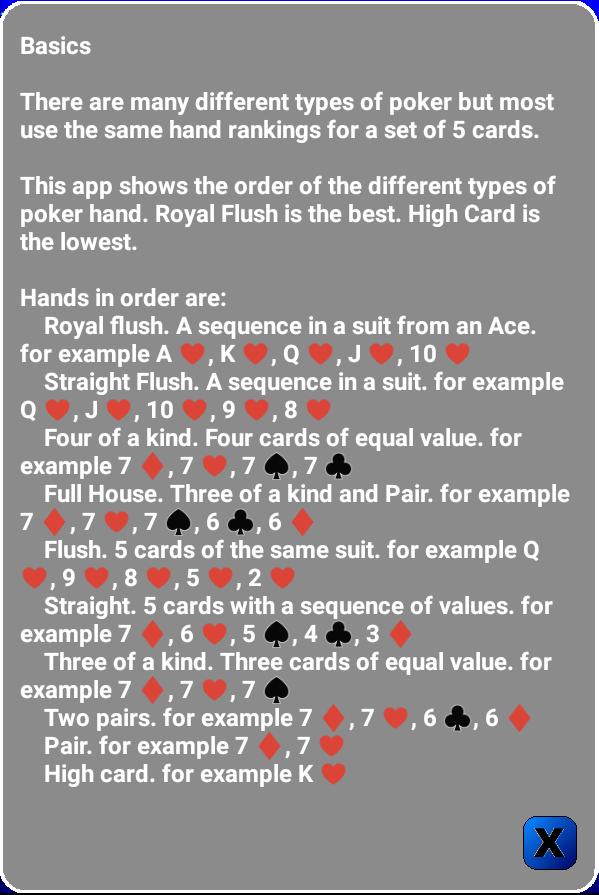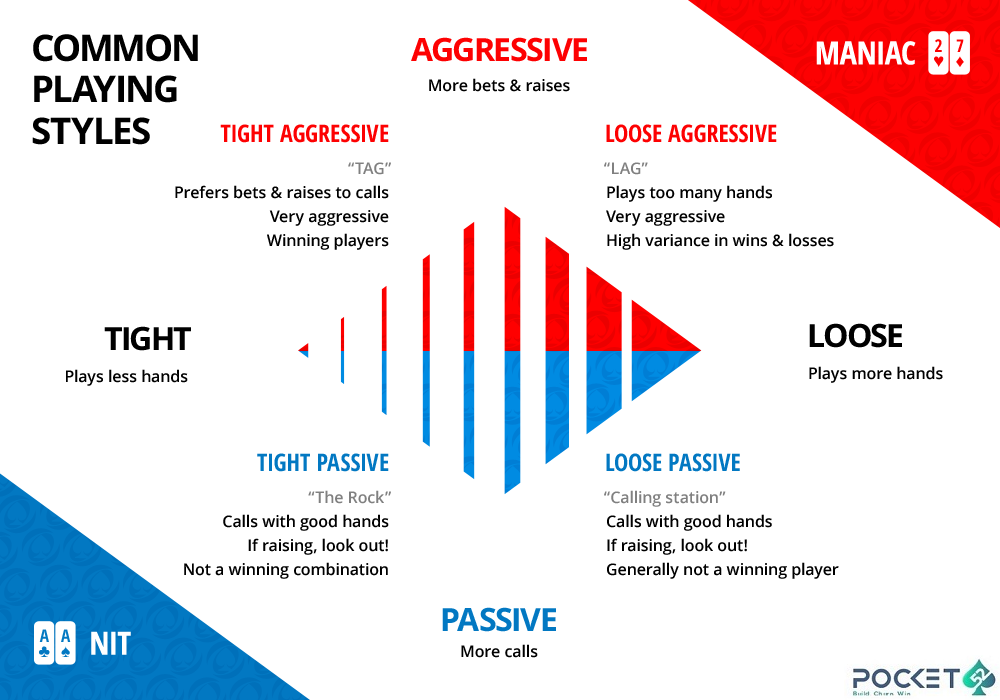How Many Different Poker Hands Are There
- How Many Different Full House Poker Hands Are There
- How Many Different Poker Hands Are There Now
- Combinations In Poker
There are 13 card ranks in a deck. So if we exclude AA, A8 and A9, 10 different types of Ax hand remain that make top pair, each with 12 combinations. That’s a total of 120 (10. 12) different combinations of top pair on this texture. That’s still a relatively comfortable calculation. Of the 1,326 combinations, there are 169 distinct starting hands grouped into three shapes: 13 pocket pairs (paired hole cards), 13 × 12 ÷ 2 = 78 suited hands and 78 unsuited hands; 13 + 78 + 78 = 169. The relative probability of being dealt a hand of each given shape is different.
I often read that there are 169 possible starting hands in Hold 'em, but my calculations show different. Bear with me If suits don't matter and AcKd = AdKs = any AKsuited then there are THIRTEEN hole cards with an ace say AA - A2 lets call AA A.1(the highest) and A2 A.13(the lowest).
|
Sanderson M. Smith
Home About Sanderson Smith Writings and Reflections Algebra 2 AP Statistics Statistics/Finance Forum
In many forms of poker, one is dealt 5 cards from astandard deck of 52 cards. The number of different 5 -card pokerhands is
A wonderful exercise involves having students verify probabilitiesthat appear in books relating to gambling. For instance, inProbabilities in Everyday Life, by John D. McGervey, one findsmany interesting tables containing probabilities for poker and othergames of chance.
This article and the tables below assume the reader is familiarwith the names for various poker hands. In the NUMBER OF WAYS columnof TABLE 2 are the numbers as they appear on page 132 in McGervey'sbook. I have done computations to verify McGervey's figures. Thiscould be an excellent exercise for students who are studyingprobability.
How Many Different Full House Poker Hands Are There
There are 13 denominations (A,K,Q,J,10,9,8,7,6,5,4,3,2) in thedeck. One can think of J as 11, Q as 12, and K as 13. Since an acecan be 'high' or 'low', it can be thought of as 14 or 1. With this inmind, there are 10 five-card sequences of consecutive dominations.These are displayed in TABLE 1.
 TABLE 1
TABLE 1

The following table displays computations to verify McGervey'snumbers. There are, of course , many other possible poker handcombinations. Those in the table are specifically listed inMcGervey's book. The computations I have indicated in the table doyield values that are in agreement with those that appear in thebook.
N = NUMBER OF WAYS listed by McGervey | |||
Straight flush | There are four suits (spades, hearts, diamond, clubs). Using TABLE 1,4(10) = 40. | ||
Four of a kind | (13C1)(48C1) = 624. Choose 1 of 13 denominations to get four cards and combine with 1 card from the remaining 48. | ||
Full house | (13C1)(4C3)(12C1)(4C2) = 3,744. Choose 1 denominaiton, pick 3 of 4 from it, choose a second denomination, pick 2 of 4 from it. | ||
Flush | (4C1)(13C5) = 5,148. Choose 1 suit, then choose 5 of the 13 cards in the suit. This figure includes all flushes. McGervey's figure does not include straight flushes (listed above). Note that 5,148 - 40 = 5,108. | ||
Straight | (4C1)5(10) = 45(10) = 10,240 Using TABLE 1, there are 10 possible sequences. Each denomination card can be 1 of 4 in the denomination. This figure includes all straights. McGervey's figure does not include straight flushes (listed above). Note that 10,240 - 40 = 10,200. | ||
Three of a kind | (13C1)(4C3)(48C2) = 58,656. Choose 1 of 13 denominations, pick 3 of the four cards from it, then combine with 2 of the remaining 48 cards. This figure includes all full houses. McGervey's figure does not include full houses (listed above). Note that 54,912 - 3,744 = 54,912. | ||
Exactly one pair, with the pair being aces. | (4C2)(48C1)(44C1)(40C1)/3! = 84,480. Choose 2 of the four aces, pick 1 card from remaining 48 (and remove from consider other cards in that denomination), choose 1 card from remaining 44 (and remove other cards from that denomination), then chose 1 card from the remaining 40. The division by 3! = 6 is necessary to remove duplication in the choice of the last 3 cards. For instance, the process would allow for KQJ, but also KJQ, QKJ, QJK, JQK, and JKQ. These are the same sets of three cards, just chosen in a different order. | ||
Two pairs, with the pairs being 3's and 2's. | McGervey's figure excludes a full house with 3's and 2's. (4C2)(4C1)(44C1) = 1,584. Choose 2 of the 4 threes, 2 of the 4 twos, and one card from the 44 cards that are not 2's or 3's. |
How Many Different Poker Hands Are There Now
'I must complain the cards are ill shuffled 'til Ihave a good hand.'
-Swift, Thoughts on Various Subjects
Home About Sanderson Smith Writings and Reflections Algebra 2 AP Statistics Statistics/Finance Forum
Combinations In Poker

Previous Page Print This Page
Copyright © 2003-2009 Sanderson Smith